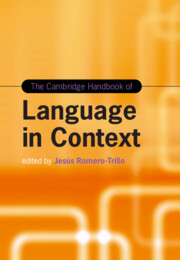Book contents
- The Cambridge Handbook of Language in Context
- Cambridge Handbooks in Language and Linguistics
- The Cambridge Handbook of Language in Context
- Copyright page
- Contents
- Figures
- Tables
- Contributors
- Acknowledgments
- Language in Context Studies
- Part I Language in Context: A Sociohistorical Perspective
- Part II Philosophical, Semantic, and Grammatical Approaches to Context
- Part III Pragmatic Approaches to Context
- 8 The Role of Context in Gricean and Neo-Gricean Pragmatics
- 9 Sociopragmatics and Context
- 10 Natural Semantic Metalanguage and Context
- 11 Relevance Theory and Context
- 12 The Interplay of Linguistic, Conceptual, and Encyclopedic Knowledge in Meaning Construction and Comprehension
- 13 Corpus Pragmatics
- 14 Prosodic Pragmatics in Context
- Part IV Applications of Context Studies
- Part V Advances in Multimodal and Technological Context-Based Research
- Index
- References
13 - Corpus Pragmatics
from Part III - Pragmatic Approaches to Context
Published online by Cambridge University Press: 30 November 2023
- The Cambridge Handbook of Language in Context
- Cambridge Handbooks in Language and Linguistics
- The Cambridge Handbook of Language in Context
- Copyright page
- Contents
- Figures
- Tables
- Contributors
- Acknowledgments
- Language in Context Studies
- Part I Language in Context: A Sociohistorical Perspective
- Part II Philosophical, Semantic, and Grammatical Approaches to Context
- Part III Pragmatic Approaches to Context
- 8 The Role of Context in Gricean and Neo-Gricean Pragmatics
- 9 Sociopragmatics and Context
- 10 Natural Semantic Metalanguage and Context
- 11 Relevance Theory and Context
- 12 The Interplay of Linguistic, Conceptual, and Encyclopedic Knowledge in Meaning Construction and Comprehension
- 13 Corpus Pragmatics
- 14 Prosodic Pragmatics in Context
- Part IV Applications of Context Studies
- Part V Advances in Multimodal and Technological Context-Based Research
- Index
- References
Summary
The chapter gives a state-of- the-art overview of the themes and issues in corpus pragmatics and describes new directions in the field represented by empirical corpus studies where synchronic pragmatic variation and change are analyzed in a broader social and cultural perspective. The interaction between corpora and pragmatics implies both challenges and possibilities. Corpora are ideal for studying the relationship between form and function.This is illustrated by studies using corpora for the purpose of investigating the functions of pragmatic markers, interjections, address forms, and pauses. Nowadays there is also a great deal of interest in finding strategies, making it possible to study the linguistic realisations of functions such as speech acts, hedging, and politeness. Pragmatic annotation systems are expected to be interesting from this perspective. New developments in corpus pragmatics are characterized by alliances between corpus pragmatics and other fields such as variational pragmatics and sociopragmatics with a shared interest in the influence of context on language. Pragmatic markers are, for example, now studied on the basis of corpora with respect to macro-sociolinguistic variables such as region, genre, and the age, gender, and social class of the speakers. Attention is also given to a new discipline of historical corpus pragmatics emerging at the intersection between historical linguistics, pragmatics, and corpus linguistics.
Keywords
Information
- Type
- Chapter
- Information
- The Cambridge Handbook of Language in Context , pp. 289 - 313Publisher: Cambridge University PressPrint publication year: 2023
